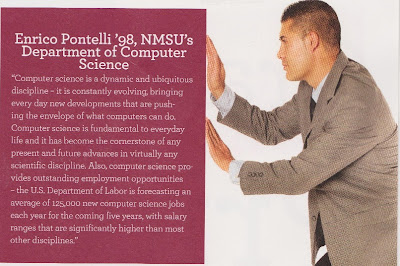Project Enable helps mobility disabled hone computer skills
LAS CRUCES >> The ability to create his own smartphone application is what drew Rudy Garcia into the program, and developing career-ready computer skills is what kept him there.
Garcia, of El Paso, has a mobility disability, which makes him perfect for Las Cruces-based Project Enable, a National Science Foundation-funded program that aims to increase the participation of people with mobility disabilities in computing.
"We are trying to get people to go back to school and get computing-related degrees, like computer science, software engineering, any STEM (science, technology, engineering and mathematics) related degree, and do that as a career," said Dr. Jeanine Cook, with New Mexico State University, who wrote the grant proposal for the program. "The problem is that there aren't enough people going into these areas. There are actually more jobs than bodies to do those jobs."
The program was started five years ago, and up until last year, has only had workshops in Pennsylvania, which has a denser population.
Garcia, part of the inaugural local group, said the program allows participants to look at different majors and careers they would be able to do according to their ability.
"It's been a great experience," he said.
The first local workshop — held at Highland Regional Rehabilitation Hospital in El Paso — began when Project Enable reached out to the Spinal Injury Support Group there looking for participants.
"I think people just have this thought that (in computer sciences) they're going to be bored all the time, doing math non-stop and never talking to another human being. That's not the case at all," said Karin Rankin, NMSU Project Enable
coordinator.
The first local workshop, or cohort, was held last July and focused on using software to learn the concepts of computer programming by making a video. The second cohort, held a month later in August, taught computer science through robotics, which, according to the Project Enable website, has been shown to be effective for students who have had no prior introduction or experience with computing.
During the August workshop, participants each received a robot kit that included an on-board computer, sensors for light and obstacles, motors and a power supply for the robot's moveable limbs. After assembly, they put the robots they built through an obstacle course.
The cohorts last for three days, with three-hour sessions the first two days (dinner is provided each session) and a six-hour day on the final day, followed by a gala dinner in which family of the participants are invited to view their work.
The second session of cohorts will begin on Jan. 30, at Highland Regional Rehabilitation Hospital in El Paso, and will be held through Feb. 1. This workshop will again use software for participants to create a digital video that will be showcased for friends and family during the final day of the workshop, at the gala dinner.
Dates for this session's remaining cohorts have not been determined yet, but participants will get to build robots in the second cohort of the session and, for the third cohort, according to the website, will be introduced to developing applications for smartphones using basic programming concepts.
Rankin said the program is free and open to anyone with a mobility disability, which is defined as a condition limiting physical ability, or lack of movement due to disease, amputation, paralysis, injury or developmental condition.
For their participation, group members receive $1,000 for remaining in the program for the whole year and participating in activities that include the cohorts, career night, technology night and a tour of the STEM-related areas at NMSU.
"During the rest of the time, they're assigned a mentor, which is a college student involved in computer science or technology, who contacts them biweekly to see if they have questions and provide those individuals with information, like what scholarships are available," Rankin said.
There are still spots open for this session of the program, Rankin said. To fill out an application for the program and to attend the first cohort on Jan. 30, or for more information, visit Project Enable online at project-enable.org, or contact Rankin at karran@nmsu.edu or prjnable@nmsu.edu.
"It's amazing to see how excited they are about what they want to do with their lives," Rankin said of former participants. "You're just floored everyday when you talk to these people who have difference challenges than the average college student, but they won't let it stop them."
"Go in open-minded and give every subject a chance," Garcia recommends to anyone considering the program. "Give whatever you're learning that day a chance."














